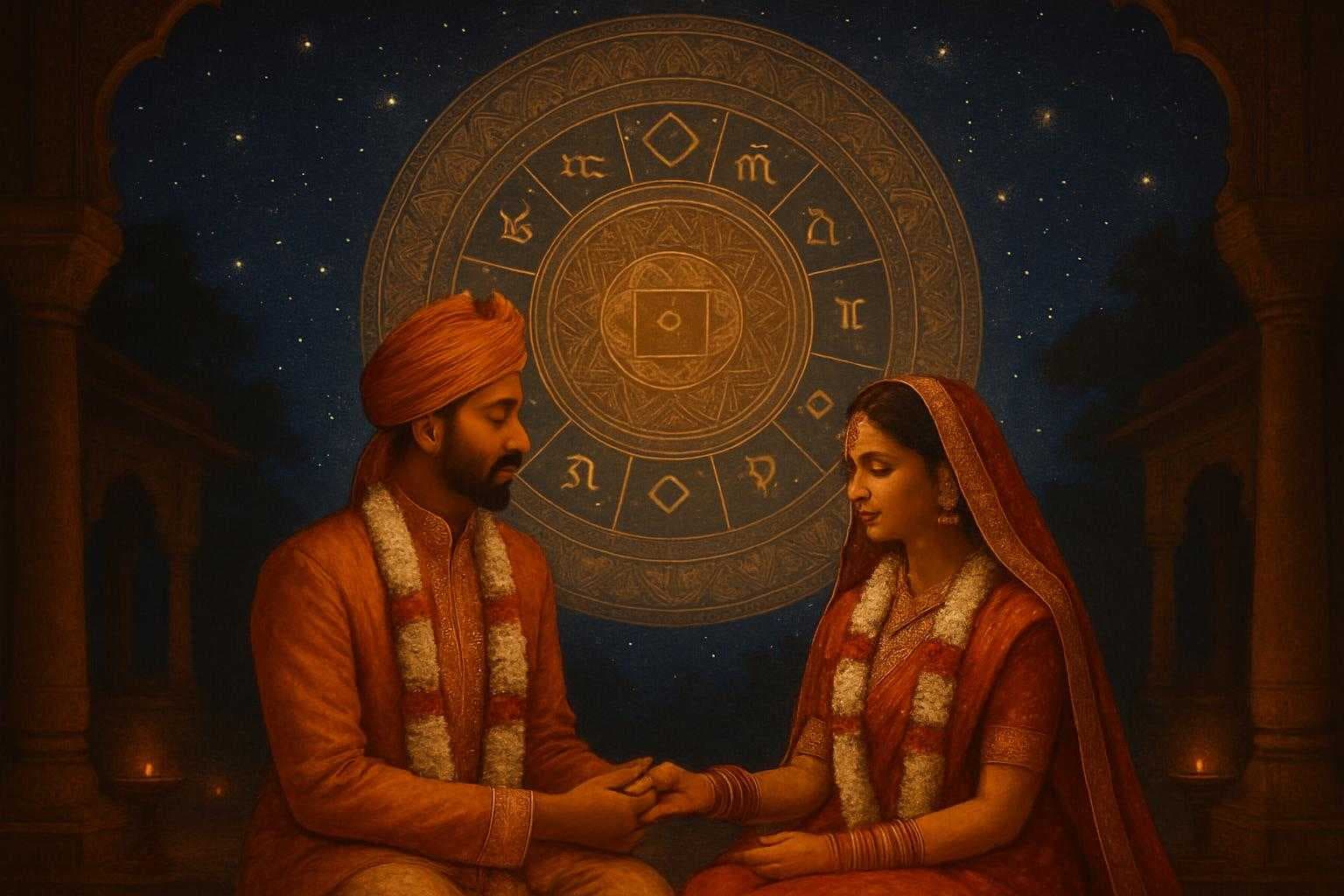
Unlocking the Timing and Harmony of Marriage Through the 7th House in Vedic Astrology
June 22, 2025
Introduction: The 7th House and the Journey of Marriage
In Vedic astrology, marriage is more than just a contract; it is a deeply karmic union, shaping our life's journey in profound ways. The Saptama Bhava, or 7th house, is the astrological arena that governs partnerships, marriage, and our approach to harmony in relationships. Whether you are searching for the right partner, curious about the timing of your marriage, or seeking ways to nurture harmony in your union, a deep understanding of the 7th house can shine a guiding light.
Foundations of the 7th House: Location, Lords, and Strength
The 7th house in the birth chart, counted from the Ascendant (Lagna), reveals the qualities one seeks in a partner and the overall experience in marriage. According to the Brihat Parashara Hora Shastra (BPHS), the 7th house also represents our capacity for compromise, sensuality, and our experience of social contracts.
A strong 7th house lord (Saptamesh)-well-placed in a friendly sign and associated with benefics-generally denotes stability and harmony in marriage. When afflicted by malefics like Saturn (Shani), Mars (Mangal), or Rahu/Ketu (the lunar nodes), challenges in finding a partner or maintaining harmony may arise. The planets occupying this house, as well as aspects (drishti) from Jupiter (Guru), Venus (Shukra), or Mercury (Budh), are especially favorable, indicating joy and peace in partnerships.
Nakshatras and Marriage: The Subtle Influence
Nakshatras, or lunar mansions, add a nuanced layer of interpretation to the timing and harmony of marriage. For the 7th house, focus is often placed on the Nakshatra that hosts the 7th house cusp, its lord, and planets conjoined or aspecting this point. Certain nakshatras, like Rohini (growth and fertility), Swati (adaptability), and Uttara Phalguni (union and support), are considered auspicious for relationships.
The position of Venus and Jupiter in auspicious nakshatras often enhances the quality and timing of unions, signaling harmony and a sense of fulfilment in marital life. Meanwhile, malefic or tumultuous nakshatra placements--like those ruled by Ketu or involved in Gandanta (spiritual knots)--can indicate delays or learning curves on the road to harmony. Reflecting on the story and symbolism of your relevant nakshatras can provide meditative insight into your approach to intimacy and partnership.
Yogas: Signs of Timely and Harmonious Marriage
Specific planetary combinations (yogas) revealed in the chart can provide guidance about the timing and harmony of marriage:
-
Kalatra Karaka (significator of spouse): Venus for men, Jupiter for women. Their strength and dignity (such as being exalted or in their own signs) greatly benefit marriage prospects.
-
Gaja-Kesari Yoga: Formed when Jupiter is in a Kendra (angle) from the Moon. This yoga indicates grace and harmony, often leading to fortunate marital unions and mutual respect.
-
Darakaraka (Jaimini system-planet with lowest degree in the chart): Analyzing the placement of your Darakaraka and its connections to the 7th house can reveal the qualities your soul seeks in partnership and the inherent lessons of your marriage path.
-
Malefic afflictions (like Mars or Saturn in the 7th, known as Kuja Dosha or Mangal Dosha): These need not portend doom, but the timing of marriage and the nature of the partnership often require conscious remedies and awareness.
Dasha Sequences: The Celestial Clock for Marriage Timing
No discussion of timing is complete without considering Vimshottari Dasha, the planetary period system uniquely used in Vedic astrology. This system reveals when the karmic seeds of marriage might be most likely to sprout.
Major marriage events often occur during the Dasha or Antar-Dasha (major or subperiod) of the 7th house lord, Venus, Jupiter, or planets in the 7th house. For some, marriage is signaled during the Dasha of the Darakaraka.
If there is a delay, it is often due to running the Dasha of a malefic graha influencing the 7th or 7th Lord, suggesting important growth or lessons must be embraced before marriage is actualized. Use this as an opportunity for self-inquiry and preparation rather than discouragement.
Practical Reflection: Nurturing Harmony and Readiness
Astrology is both a map and a mirror. Here are some tips and practices, rooted in tradition, to nurture harmony and readiness for marriage through the lens of the 7th house:
-
Meditate on Venus or Jupiter: Recite their mantras, such as "Om Shukraya Namaha" for Venus or "Om Gurave Namaha" for Jupiter, especially on Fridays or Thursdays, to strengthen love and wisdom in relationships.
-
Observe Fasting or Charity: On Fridays (for Venus) or the day ruled by your 7th lord, consider simple fasting or donating white items (like rice or milk) to enhance the energy of your partnership karaka.
-
Engage in Self-Reflection: Journaling about the qualities you wish to share, not only seek, enhances your resonance with the positive potential of your 7th house.
-
Visit Sacred Water: The 7th house relates to water and travel; visiting rivers, lakes, or temples by water can harmonize its energies and refresh your approach to relationships.
Conclusion: Walking the Path Together
The 7th house doesn't lock us into unchangeable fate. Rather, it invites us to work consciously with the rhythms of connection, timing, and harmony that naturally unfold in our karmic journey. With insight, patience, and a touch of ritual, you can create a loving partnership that is written not only in your stars, but in your heart as well.
May your exploration of the 7th house bring not just timely union but also the deeper harmony that sustains love through the cycles of time.
No one can be defined by just one sign.
See for yourself, with a free horoscope.
Generate a Horoscope